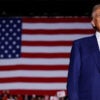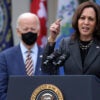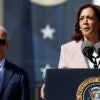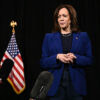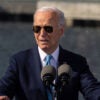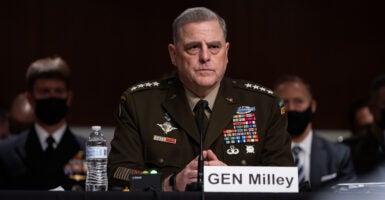In some cases, the answers were surprising. In other cases, the answers were surprising only in hearing top U.S. military leaders state publicly what already was suspected.
The Senate Armed Services Committee got some answers Tuesday from Defense Secretary Lloyd Austin; Army Gen. Mark Milley, chairman of the Joint Chiefs of Staff; and Marine Gen. Kenneth McKenzie Jr., commander of U.S. Central Command.
Most questions from senators focused on the Biden administration’s botched withdrawal from Afghanistan, but they also wanted to know about Milley’s now infamous calls to his Chinese counterpart, Gen. Li Zuocheng of the People’s Liberation Army, while Donald Trump was still president.
Austin, Milley, and McKenzie are set to testify Wednesday before the House Armed Services Committee.
Here are seven big takeaways from their appearance at the Senate hearing.
1. Military to Biden: Leave 2,500 Troops
Milley and McKenzie each said they had backed keeping 2,500 American troops in Afghanistan and feared less than that would risk that country’s falling into chaos.
Milley said he wouldn’t disclose what he advised Biden, but then appeared to do so immediately afterward.
“I won’t share my personal recommendation to the president, but I will give you my honest opinion and my honest opinion and view shaped my recommendation,” Milley said. “And I recommended that we maintain 2,500 troops in Afghanistan.”
McKenzie affirmed the same, but said he also would not share his confidential conversation with President Joe Biden.
“I recommended that we maintain 2,500 troops in Afghanistan. I also recommended in the fall of 2020 that we maintain 4,500 at that time,” McKenzie said during questioning from Sen. James Inhofe, R-Okla., the committee’s ranking member.
“Those were my personal views,” he said. “I also have a view that a withdrawal of those forces would lead inevitably to the collapse of the Afghan military forces and eventually the Afghan government.”
Sen. Tom Cotton, R-Ark., inquired whether either of the generals advised Biden on the hasty Afghan exit.
“If all this is true, Gen. Milley, why haven’t you resigned?” Cotton asked.
Milley answered that he was devoted to civilian control of the military.
“Resigning is a really serious thing. It’s a political act, if I’m resigning in protest,” Milley said. “My job is to provide advice. … That’s what the law is. The president doesn’t have to agree with that advice.”
Milley, chairman of the Joint Chiefs of Staff since 2019, added:
It would be an incredible act of political defiance for a commissioned officer to just resign because my advice is not taken. My dad didn’t get a choice to resign at Iwo Jima. And those kids there at Abbey Gate, they don’t get the choice to resign. And I’m not going to turn my back on them.
Abbey Gate is the entrance to the Kabul airport where the terrorist bombing occurred June 29, killing 13 American service members.
2. What Generals Say When Asked if Biden Lied?
Biden said in an Aug. 19 interview with ABC News that he didn’t “recall” anyone making a recommendation to him about leaving a troop contingency behind in Afghanistan, which the U.S. and coalition forces invaded in late 2001 after the 9/11 terrorist attacks on America.
ABC News anchor George Stephanopoulos, a former Clinton White House official, asked Biden: “Your top military advisers warned against withdrawing on this timeline. They wanted you to keep about 2,500 troops.”
Biden responded: “No, they didn’t. It was split. That wasn’t true. That wasn’t true.”
Stephanopoulos gave him another chance in the interview.
Biden answered: “No, not in terms of whether we were going to get out, in a time frame, all troops. They didn’t argue against that.”
Stephanopoulos, as if aware otherwise, asked yet again.
“So your military advisers did not tell you we should just keep 2,500 troops? It’s been a stable situation for the last several years. We can do that. We can continue to do that.”
Biden held firm.
“No. No one said that to me that I can recall,” the president answered.
Biden’s credibility has come under question on numerous points regarding the U.S. retreat from Afghanistan.
Cotton asked Austin, a retired four-star Army general, whether Biden was telling the truth.
“I know the president to be an honest and forthright man,” Austin replied.
After Cotton asked for a direct answer, the secretary said, using passive voice: “Their input was received by the president, for sure.”
Sen. Dan Sullivan, R-Alaska, later pushed the generals on Biden’s statement.
“He’s not telling the truth to the American people,” Sullivan said. “The president said none of his military advisers told him that he should keep U.S. forces in Afghanistan. Gen. Milley, that was a false statement by the president of the United States, was it not?”
Milley first wavered.
“I didn’t even see the statement, to tell you the truth,” Milley said.
After being pressed, he said: “I’m not going to categorize a statement of the president of the United States.”
Sullivan asked McKenzie: “Remember, you do not have to cover for the president when he’s not telling the truth. Was that a false statement or not?”
McKenzie also didn’t answer directly.
“I’ve given you my opinion on the matter,” McKenzie said. “I’ve given you my judgment.”
Sullivan said, “I think we all know it was a false statement.”
Notably, neither the defense secretary nor the two generals said Biden made a true statement.
3. About Those China Phone Calls
Without being asked, Milley talked about his conversations with Li, chief of the Joint Staff Department of China’s Central Military Commission, regarding Trump.
“I routinely communicated with my colleague, Gen. Li, with the knowledge and coordination of civilian oversight. I am specifically directed to communicate with the Chinese by Department of Defense guidance, the policy dialogue system,” Milley said.
Milley’s calls to Gen. Li—one Oct. 30, the other Jan. 8—were first reported in the new book “Peril” by Washington Post reporters Bob Woodward and Robert Costa.
Milley’s second call to Li came two days after the Jan. 6 riot at the U.S. Capitol by several hundred Trump supporters.
Trump has said that he knew nothing of Milley’s calls to Li.
Milley said the calls were “coordinated before and after” with then-Defense Secretary Mark Esper and, later, acting Defense Secretary Chris Miller.
This response seemed to contradict the book, which cast his actions as independent and thus troubling to many observers because of the American tradition of civilian control of the military.
“The specific purpose of the January calls were generated by a concerning intelligence, which caused us to believe that the Chinese were worried about an attack on them by the United States,” Milley said. “I know, I am certain, that President Trump did not intend to attack the Chinese. It is my directed responsibility, and it was my directed responsibility, by the [defense] secretary to convey that intent to the Chinese.”
Milley also tried to clarify his phone call with House Speaker Nancy Pelosi, D-Calif., also reported in the Woodward-Costa book. Pelosi called to ask him about Trump’s ability to launch nuclear weapons, he said.
“I sought to assure her that nuclear launch is governed by a very specific and deliberate process,” Milley said. “She was concerned and made various personal references characterizing the president. I explained to her that the president is the sole nuclear launch authority, [but] he doesn’t launch them alone, and that I am not qualified to determine the mental health of the president of the United States.”
During an exchange about China later with Alaska’s Sullivan, Milley also said: “I didn’t give them a heads-up because we weren’t going to attack.” And the general said of Trump: “I was being faithful to the president’s intent.”
4. Milley Source for Woodward, Other Anti-Trump Authors
Milley said he spoke with authors of all of the recent anti-Trump books, in response to a question from Sen. Marsha Blackburn, R-Tenn.
The Army general said he talked to Woodward but not Costa for “Peril.” He said he also spoke to authors Carol Leonnig and Philip Rucker, also Washington Post reporters, for their book “I Alone Can Fix It: Donald J. Trump’s Catastrophic Final Year,” and spoke to Michael Bender, a Wall Street Journal reporter, for his book “Frankly, We Did Win This Election: The Inside Story of How Trump Lost.”
“Were you accurately represented in these books?” Blackburn asked.
Milley said he hadn’t read the books.
“I haven’t read any of the books, so I don’t know. I’ve seen press reporting of it. I haven’t read the books,” Milley said.
Blackburn followed with a homework assignment.
“Let’s have you read the books and let us know if you are accurately presented and portrayed,” she said.
Milley answered: “Absolutely. Happy to do it.”
5. How Many Americans Left
“How many American citizens in your opinion are still there?” Inhofe, the committee’s ranking member, asked about Afghanistan.
The military leaders indicated they aren’t sure how many American civilians remained behind after the military evacuation.
Austin at first deferred the question to the State Department.
Inhofe noted that early estimates by Secretary of State Antony Blinken were that between 10,000 and 15,000 Americans were left behind.
“They evacuated some 6,000. That would mean a minimum of 4,000 would still be there now. Would anyone disagree with that?” Inhofe asked.
After a few seconds, the Oklahoma Republican said: “By your silence, I assume you agree.”
Austin addressed the question, but not with a direct answer.
“I personally don’t believe that there are 4,000 American citizens still left in Afghanistan, but I cannot confirm or deny that, Senator,” Austin said.
After the chaotic evacuation and the deaths of 13 U.S. service members, Biden characterized the retreat from Afghanistan as an “extraordinary success.”
Later in the hearing, Blackburn asked: “Is leaving Americans behind an extraordinary success?”
Austin answered: “We are not leaving Americans behind.”
After initial estimates of between 10,000 and 15,000 Americans being in Afghanistan, Biden has stated that the number is closer to between 100 and 200 American citizens left behind there.
Sen. Roger Wicker, R-Miss., noted that in the same ABC News interview, Biden had said: “If there are American citizens left, we are going to stay and get them all out.”
“The president, our commander in chief, did exactly the opposite,” Wicker said, adding later: “Our credibility has been gravely damaged, has it not, Gen. Milley?”
“I think our credibility with allies and partners around the world and with adversaries is being intensely reviewed by them to see which way this is going to go. I think that damage is one word that could be used, yes.”
6. Milley: Trump Wanted Out in January
Milley said that Trump at one point directed that the remaining 2,500 troops get out of Afghanistan by Jan. 15, but backed away from that decision.
If true, that deadline would have been five days before Trump left office.
Trump settled on May 1 as a departure deadline, before that date was moved by Biden after he took office in January, Milley said.
“On 11 November 2020, I received an unclassified signed order directing the United States military to withdraw all forces from Afghanistan no later than 15 January 2021,” Milley told the committee. “After further discussion regarding the risks associated, the order was rescinded.”
Critics of Biden’s exit from Afghanistan said it isn’t the withdrawal that is the issue, but the way in which the administration and the military did it.
Armed Services Chairman Jack Reed, D-R.I., later noted: “The Biden administration through the National Security Council process conducted a rigorous interagency review of the situation in Afghanistan.”
“You also testified that you received an order in November of 2020 to withdraw all forces from Afghanistan by Jan. 15, 2021. Was that November order similarly informed by a rigorous interagency review?” Reed asked.
“No,” Milley answered. “Secretary Esper submitted his recommendations in a written format on the 9th, the day that he was relieved, 48 hours later we received a written order to go to zero [troops] by 15 January.”
In a tweet Nov. 9, six days after the election, Trump wrote that he had “terminated” Esper as defense secretary.
7. Success and Failure
Milley admitted that the Afghanistan exit didn’t go the way the generals hoped.
“It was a logistical success, but a strategic failure,” Milley said. “And I think those are two different [things].”
Austin stressed: “It was the largest airlift conducted in U.S. history and it was executed in 17 days. Was it perfect? Of course not.”
But Austin summarized the low points.
“Tragically, lives were lost. Several Afghans killed climbing aboard an aircraft on that first day, 13 brave U.S. service members and dozens of Afghan civilians killed in a terrorist attack on the 26th, and we took as many as 10 innocent lives in a drone strike [in Kabul] on the 29th,” Austin said.
Have an opinion about this article? To sound off, please email [email protected] and we’ll consider publishing your edited remarks in our regular “We Hear You” feature. Remember to include the URL or headline of the article plus your name and town and/or state.







